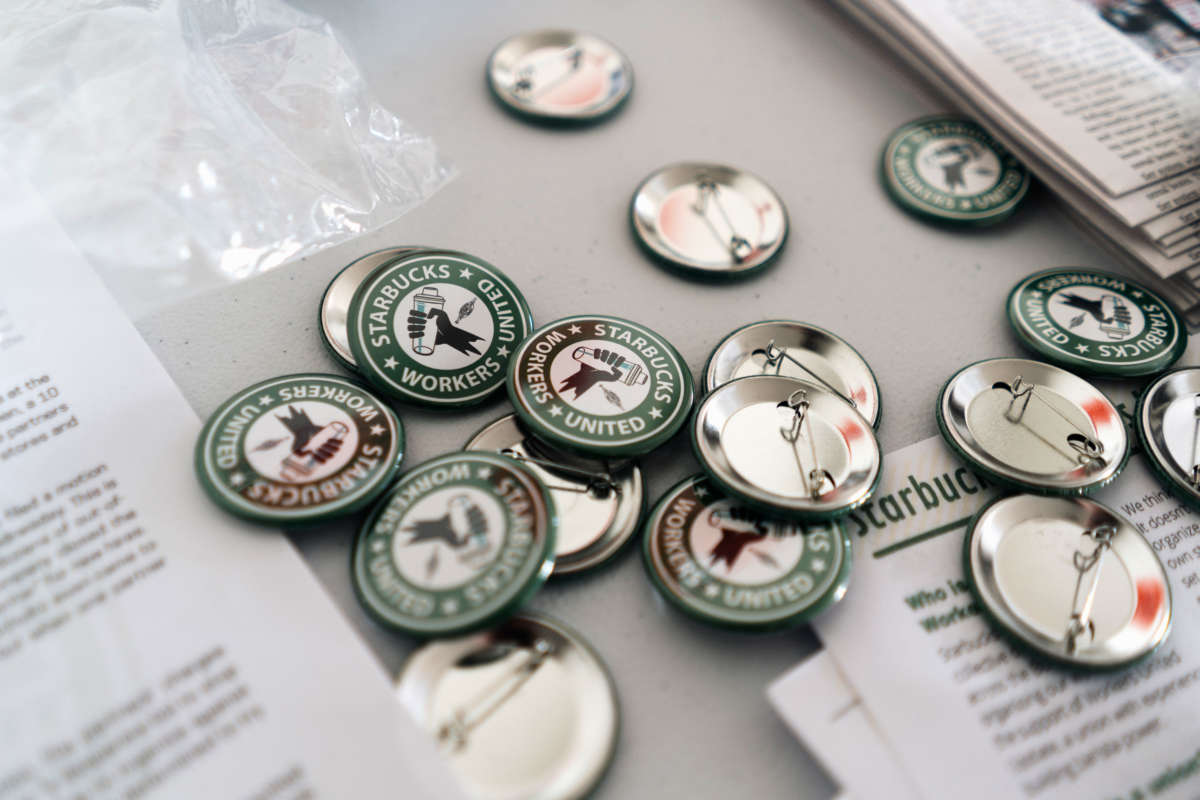Did you know that Truthout is a nonprofit and independently funded by readers like you? If you value what we do, please support our work with a donation.
Starbucks workers successfully unionized another store on Monday, making the Genesee Street store in Buffalo, New York, the second corporate-owned Starbucks location in the U.S. to form a union.
The National Labor Relations Board (NLRB) certified the results for the Genesee Street store in Buffalo after reviewing ballots that had been disputed by the union. The final count was 15 to 9 in favor of unionization.
After a month of deliberation, the NLRB ultimately ruled against the inclusion of ballots filled out by employees from another store, which the company used in an attempt to pack the vote. Camp Street, a third store in Buffalo, voted against unionizing, though Starbucks Workers United is disputing the results.
Workers at Genesee Street celebrated the news. “Words cannot describe how we are feeling right now,” Genesee Street shift supervisor Caroline Lerczak told WGRZ. “After months of anti-union meetings, intimidation tactics, and intense pressure to vote ‘no’, we can finally say we won our union. I would love to see Starbucks show some accountability for their actions and come to the bargaining table to negotiate with us now.”
The workers faced a fierce union-busting campaign from the company, which sent executives to Buffalo to intimidate workers. The company also took drastic steps like shutting down unionizing stores temporarily, seemingly to make unionizing more difficult. This is in spite of the organizing workers requesting that the company follow Starbucks Workers United’s “Fair Election Principles” that ask the company not to interfere with unionization.
As other stores kick off union campaigns, however, the company appears to be moving its anti-union tactics elsewhere. Workers at another unionizing location, Depew in Buffalo, have said that the company has purposefully scheduled workers erratically, seemingly to throw a wrench in organizing efforts and destabilize workers by forcing them to work inconsistent hours.
The company also reportedly created unsafe working conditions by overstaffing, which doesn’t allow frontline workers to distance themselves from others in the face of yet another wave of coronavirus.
However, the sheer number of unionizing stores may make it difficult for the company to wage a large-scale union-busting campaign at every store. Roughly 17 stores have filed to unionize in recent months, with more stores filing nearly every week since the first store, Elmwood in Buffalo, voted for unionization.
According to the union, Starbucks workers at the Hopewell, New Jersey location were the latest to file. Three other stores have also filed to unionize in recent days, with workers in Chicago, Cleveland, and Eugene, Oregon, citing the company’s stated principles as reasons why executives should allow workers to organize.
For context on just how rapidly these Starbucks stores are unionizing, the most actively organizing sector in 2021 was cannabis workers in Illinois: 13 IL weed workplaces filed for a vote in 2021.
Meanwhile, 6 Starbucks stores have filed for elections in the past two weeks.
— Jonah Furman (@JonahFurman) January 11, 2022
Employees have pointed to poor working conditions – including understaffing issues and being forced to come in sick – as a reason to organize. Indeed, Elmwood workers went on strike last week to protest unsafe COVID protocols. According to a letter from union members obtained by Vice, one barista at the location had tested positive.
“We believe that Starbucks should close our store and pay our partners until we can re-open safely and fully staffed, with those who have been exposed having the opportunity to isolate and stop the spread,” the letter read. “We are on strike until we believe it is safe to return to work.” The strike ended on Monday.
Media that fights fascism
Truthout is funded almost entirely by readers — that’s why we can speak truth to power and cut against the mainstream narrative. But independent journalists at Truthout face mounting political repression under Trump.
We rely on your support to survive McCarthyist censorship. Please make a tax-deductible one-time or monthly donation.
